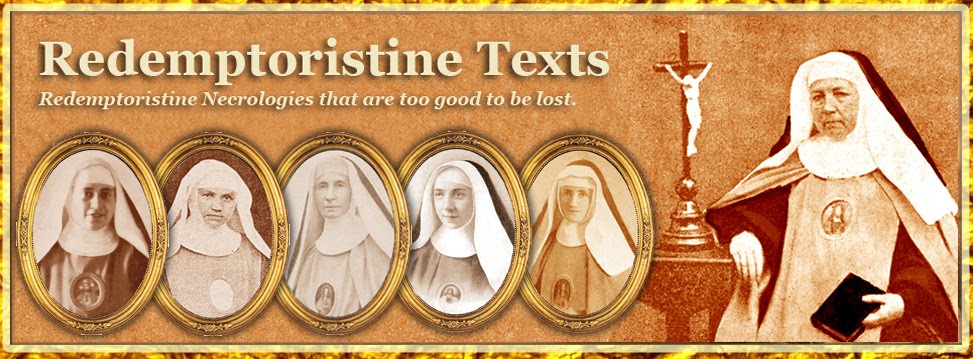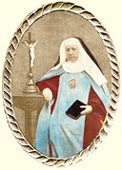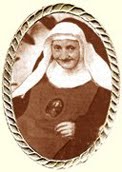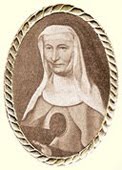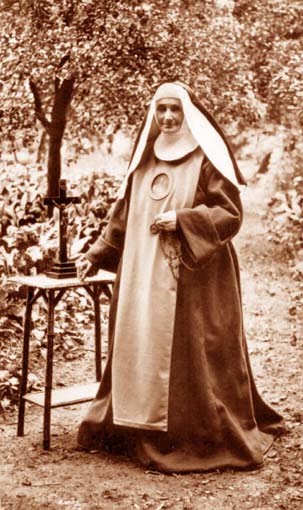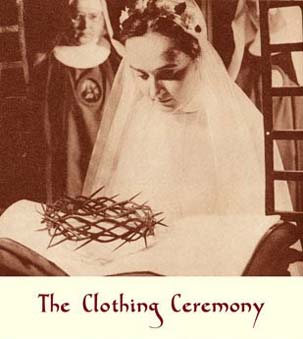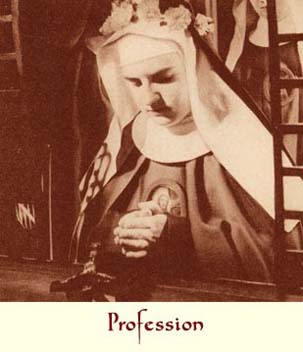Chapter V.
Mother Mary-Aloyse is named Directress of the Noviciate (1852-1870).
Mother Mary-Aloyse is named Directress of the Noviciate (1852-1870).
The letter which we are about to cite was addressed to Mother Mary-Aloyse, Mistress of Novices: this responsibility was in fact entrusted to our modest heroine in 1852, and she exercised it until 1870.
Formed as she was in the school of Mother Mary-Philomena, and abundantly nourished on the instructions of the Rev. Father Passerat, Sister Mary-Aloyse also received from God the precious qualities which disposed her to government. Her practical sense was rare, her judgement excellent, and her knowledge of the spiritual ways permitted her to guide others along the path of perfection. The sweet teachings of St. Alphonsus also served her as a rule, and in the school of this great master, she had learnt to require nothing that was beyond the powers or the abilities of her disciples, but what she always firmly required was for everyone to avoid deliberate faults with the greatest care, to do penance for those which they had committed, and to apply themselves diligently to fulfil all the obligations imposed on them by the Rule. Effort, a care for detail, unhurried actions, these indispensable elements in tendency to perfection, were also the subject of her recommendations, but she wanted everything to be inspired, sustained and brought to a good end through the love of Jesus Christ. So she gave a soul to this body of sometimes meticulous practices which are called spiritual warfare, and a sure pledge of success to efforts that the lack of love condemns too often to powerlessness.
Let us hear her former novices themselves speak to us of some events in their noviciate.
“On the first Friday of each month,” one of them writes, “Sister Mary-Aloyse required her novices to put down in writing the accusation they proposed to make against themselves, so as to rectify it if possible. One day, when a novice brought her piece of paper to her, she noticed her mistress crossing out a sentence in which she accused herself of having wrongly judged her Superior, and of having said several words expressing criticism. So she permitted herself to ask her the reason for this, expressing her regret to her and the desire she had for repairing and expiating her fault. Sister Mary-Aloyse said to her, “This fault is so displeasing to Our Lord’s Heart that a novice must never commit it. Make Him a sincere promise that never again will you cause Him this pain, as whoever despises her Superiors wounds Him right to the Heart.” She imposed a small penance on the novice, who corrected herself, through the fear of causing pain to Jesus Christ Himself.”
“A novice experienced an antipathy towards a Sister whose manners upset her, and some of whose practices toward her were hurtful to her. It was the custom to beg for soup in the refectory. The novice found this penance agreeable, we might even say amusing, but she never managed to bring herself to do it, because the young Sisters had to give way to the older ones. Finally she succeeded one day in taking hold of the blessed dish that she had coveted for so long, and got ready most happily to go round the refectory on her knees to beg for her bread, when Sister N took the soup-plate out of her hands to do the penance in her place. - This trial was too much for the novice. She went and complained to the Mistress, not being able to suppress some disagreeable reflections about the Sister who had supplanted her. When she had finished venting her spleen, the Mother Mistress said to her: “My dear Sister, far too often you have noticed this and that in this fervent religious. Believe me, if you do not take care, you will nourish an antipathy inside you which will be a source of many imperfections for you. If you want to stop this right at the beginning, this is what you must do: every time when , for one cause or another, you feel a sense of discontentment against this good Sister, find an occasion to render her a service, or go up to her in recreation to say something nice to her.” The novice followed this advice and found it good, and applied it for the rest of her life to every Sister whom she did not like, and thanks to the good advice of her devoted Mistress, she managed, by repeated acts, to be able sometimes to quite set aside the dislikes she felt for the Sisters who beforehand seemed so disagreeable to her.
“A novice (it is the same Sister talking), a novice was often criticised for the attachment she had to her own will. On one of the monthly retreats, she wished to give her Mistress a surprise. She sent her a rosary case made of coconut wood, and told her, “Mother, this detachment is small, it is true, but it has cost me a great deal.” Sister Mary-Aloyse took the little box and opened it as they talked. The novice had put a little note inside it bearing the words: “My will.” The Mistress showed herself very satisfied, but added, “My Sister, do not forget this gift which you have just given me, and from time to time let me make use of it.”
Let us listen to some other accounts. Their style is quite different, but they are quite marvellous in letting us glimpse inside the noviciate of Bruges in 1861-62.
“The Reverend Mother Mary-Aloyse made us take our noviciate seriously, and ever since I have always blessed and thanked our good God, although, at the time, I found her very severe.
“In recreation, this Mother maintained the most frank cheerfulness. There were several of us French girls and two of them above all would often start talking, because, as they said, they would do anything to liven up the others. But one day, the Mother Mistress said to me, half seriously and half as a joke, “My dear Sister, I believe that if you were to spend a recreation without talking, you would do yourself a great deal of harm.” After this I replied bravely that I would try to do it from the next day on. The Mother Mistress gave a wry smile and agreed. The next day, while continually looking at Mother and the other Sisters, I kept a firm silence, as if was quite easy for me. So then she set herself to get me to talk, offering me whatever would tempt me the most, such as pictures, etc., but to my great satisfaction, the bell sounded before I could say anything. Then there was general laughter.
“Another time, while we were walking in the garden during recreation (it was in the month of November), we happened to walk near an apple-tree. I got very excited at the idea of the fruit that it would bear in the following year, but as our Mother had a better knowledge in practice of the virtues than of arboriculture, she had some doubts about my competence and said to me, “Oh well, Sister, mark the fruit buds with a bit of thread and then we will see the proof of your knowledge.”
“The following year, to my great satisfaction, the tree produced many fine buds, but then withered up entirely and died. I was most disappointed. Then my Mistress ordered me to water my apple-tree every day, which I did even among the snow and ice of a most severe winter. In Spring, divine Providence declared itself in my favour, and my apple-tree produced fine apples. It was given my name (Mary Augustine) in remembrance, and when I was sent on to the foundation of Velp, I still received fruit from my resuscitated apple-tree. It was my Mistress who brought them to me with great joy, and I ate them with great pleasure.”
These citations show Sister Mary-Aloyse as a Mistress who was concerned to advance all her charges in perfection. One of her letters will demonstrate this.
“Dear little Sister,” she wrote to one of her novices, “your good letter has pleased me greatly. Never let yourself be discouraged. Jesus is with you, and when you have worked with courage to prepare a place for Him, He will come to dwell in your heart. He is there already, but He will come in a more intimate manner, and just one of these moments will make you completely forget, or rather, bless all the days of struggling. So courage then! Everything will be well, I can assure you on behalf of Jesus, if you never cease struggling and above all, if you never let yourself be discouraged. I am very happy that you see yourself as ugly. It is a grace. Reply to it by redoubling your confidence in Him who loves you so much and who will make you beautiful, if you offer Him your hand by humbling yourself in confidence. Recollection will also come. Patience, patience. Nothing is done in one day, but you must not let a single day go by without working. You love our good God more than you believe. Bless Him for everything. It is for your own good! Good-by for now, but I shall be looking forward to seeing you again. I pray to Mary to bless you.
“Sister Mary-Aloyse.”
Velp, 24th September 1860...
Let the novices speak again.
Sister Mary Clementine, [11] from the convent of Dublin, pays tribute to the great virtues of Mother Mary Philomena, and adds:
“Regarding the good Mother Mary-Aloyse, Dear Mother, I can only say that as Mistress of Novices and as Superior, she was always an enlightened directress to me and a tender Mother, who preached equally by example and by word, and knew how to make us love our holy Rules and the practice of the religious virtues. In a word, in these two Mothers I have always venerated the archetype of true and worthy Redemptoristine Superiors.”
Sister Mary-Lidwine of the Holy Spirit [12] particularly praises the vigilance and energy of her former Mistress of Novices:
“Both of them, Mother Mary-Philomena and her were most zealous in making souls advance towards perfection and forming solid virtues in their nuns. The Mother Vicar, Sister Mary-Aloyse, was my Mistress of Novices for two years. She greatly edified me through her energy, courage and power of soul by which she made her novices advance, with her eyes and her ears always open to correct the faults which she saw in them.”
Mother Mary Gertrude, the Superior of Clapham (London), was only under the direction of Mother Mary-Aloyse for a few months. “From the first day that I knew her,” she says, “I had the greatest veneration for her. Her recollected exterior reminded me of her angelic Patron, and her air of recollection as she went through the Monastery was wonderful to see. When she was my Mistress of Novices, she was the perfect model of a religious, and through her words, which breathed the spirit of our Father Saint Alphonsus, she taught us never to recoil before any sacrifice when it touched on the good of the Order. She often told me. “You must remember that our good God wants you to be a saint. This is why you must suffer, and struggle, and love beyond all measure Him who has loved us so much.”
“To some of them she could seem severe, but this severity was due to her love of the holy Rule and our Father Saint Alphonsus. I have always heard it said that she was as simple as a little child towards her Superiors. My memory and my heart will forever retain the memory of her spirit of prayer, her fervent love for observance, and her angelic modesty. In a word, it is impossible for me to describe in their entirety the virtues that we venerate in our holy Mother Mistress, and I still love to talk to our young Sisters about her great qualities and her instructions, to encourage them to walk in the footsteps of those who have gone before us.”
Sister Mary-Magdalen of Jesus, a Redemptoristine of Dublin, renders this moving tribute to her former Mother Mistress.
“Obedience asks me to do something which I feel entirely incapable of, although I have an inexpressible desire to open my heart full of gratitude towards my former Mother Mistress, the Reverend Mother Mary-Aloyse. I was a novice under her orders for more than two years, and during this time, I venerated her like a saint, and this sentiment still remains with me and is still the same as it has been for almost forty eight years. For myself, I believe that she was the most perfect soul that I have ever known. As Mistress, she was strict, as a Mother she was full of tenderness, devotion and sacrifice. Her example was a stimulus to excite our fervour. When speaking of the little observances she would tell us, “What our Father Saint Alphonsus has prescribed for us is not too small for me to practise.” I will never forget her holy words and instructions. Dear Reverend Mother, you will excuse my initiative and my bad French. I hope you will understand me, but my affection for my beloved Mother will never change. I hope that in her heavenly home she will think of her former novice and pray for her. As my own turn is coming, I greatly hope for her prayers to obtain mercy for me from our good God, and a happy death, when it is His holy will.”
From Dublin, too, the following letter comes to us, with its own special charm:
“Your dear aunt [13] being from Liège, I was most curious to get to know her, and I observed her well.
“The Reverend Sister Mary-Aloyse has always been regarded as a holy religious. She had a very serious exterior, and she was very severe with herself, but indulgent towards others. She was a model of regular observance, and showed a great love of poverty and silence. She was also very mortified, but her dearest virtue was that of obedience. The Reverend Sister Mary-Aloyse had a remarkable love for this virtue. She would have liked to change everything into obedience.
“When she became our Mother Mistress of Novices, she seemed a little cold and distant, and we were somewhat afraid of her. In our case, that was just as well. She was very maternal. When we were suffering, she would spare nothing to comfort us.
“In recreation, she was very jolly. Sometimes we spoke in the Liège dialect, but she knew it better than me, and this amused her immensely. Sometimes I would say, “Come now, Mother Mistress, now I can tell you all my secrets in public, because none of the novices can understand a word.”
The good Mother was most eager to inspire us with a love of our vocation and the religious virtues. Later on, I learnt from one of my companions that she had become very affable, very loveable, and our dear Sister Mary-Clementine confirmed it to me. This is another tribute to her virtue, and I am persuaded that this was a fruit of her beloved obedience.
“Through humility she would never let us render her any service, and when we looked for an occasion, she tried to avoid us every time, always saying, “I am my own servant.”
“So, dear Reverend Mother, look what my poor pen has produced. I do not doubt that God and His angels knows all this even better than us, but heaven will reveal it all to us.”
Let us now add another letter to all of these. It is dated September 1905 like the preceding ones. The venerable signatory of it died two months after writing it. [14] What a wonderful sense of gratitude and filial affection is found in it!
“Dear Reverend Mother,
“It is not simply a pleasure, it is a duty for me to say some words about the virtues of our Mother Mary-Aloyse, who was my Mother Mistress in the Educandate and the Noviciate.
“This dear Mother was strict about everything concerning holy observance, and remarkably hard on herself, but she also showed a very maternal goodness towards those who addressed themselves to her. I have had this experience myself. Being naturally timid, I did not dare approach her, but as soon as I had overcome that childish fear, I found a mother’s heart in her, full of the spirit of our Father Saint Alphonsus, and seeking by all means that his spirit suggested to her, to inculcate into our young hearts the divine virtues that our divine Saviour had practised during His life, such as humility, simplicity, abnegation of self, and above everything else, holy poverty. This last virtue she practised herself with great perfection during her whole religious life, so that we could say that it was her favourite virtue.
“She recommended novices to always have a great respect for their religious costume, by keeping it clean and tidy.
“Although this good Mother was occupied all day with the task she was responsible for, when she arrived at recreation, she was always jolly like a young novice.
“May our good Jesus bless her soul in a special manner for having guided me and taught me to walk in the blessed way of holy religious life”
“Sister Maria-Angelica of the Most Holy Sacrament, Religious of the Most Holy Redeemer.”
Formed as she was in the school of Mother Mary-Philomena, and abundantly nourished on the instructions of the Rev. Father Passerat, Sister Mary-Aloyse also received from God the precious qualities which disposed her to government. Her practical sense was rare, her judgement excellent, and her knowledge of the spiritual ways permitted her to guide others along the path of perfection. The sweet teachings of St. Alphonsus also served her as a rule, and in the school of this great master, she had learnt to require nothing that was beyond the powers or the abilities of her disciples, but what she always firmly required was for everyone to avoid deliberate faults with the greatest care, to do penance for those which they had committed, and to apply themselves diligently to fulfil all the obligations imposed on them by the Rule. Effort, a care for detail, unhurried actions, these indispensable elements in tendency to perfection, were also the subject of her recommendations, but she wanted everything to be inspired, sustained and brought to a good end through the love of Jesus Christ. So she gave a soul to this body of sometimes meticulous practices which are called spiritual warfare, and a sure pledge of success to efforts that the lack of love condemns too often to powerlessness.
Let us hear her former novices themselves speak to us of some events in their noviciate.
“On the first Friday of each month,” one of them writes, “Sister Mary-Aloyse required her novices to put down in writing the accusation they proposed to make against themselves, so as to rectify it if possible. One day, when a novice brought her piece of paper to her, she noticed her mistress crossing out a sentence in which she accused herself of having wrongly judged her Superior, and of having said several words expressing criticism. So she permitted herself to ask her the reason for this, expressing her regret to her and the desire she had for repairing and expiating her fault. Sister Mary-Aloyse said to her, “This fault is so displeasing to Our Lord’s Heart that a novice must never commit it. Make Him a sincere promise that never again will you cause Him this pain, as whoever despises her Superiors wounds Him right to the Heart.” She imposed a small penance on the novice, who corrected herself, through the fear of causing pain to Jesus Christ Himself.”
“A novice experienced an antipathy towards a Sister whose manners upset her, and some of whose practices toward her were hurtful to her. It was the custom to beg for soup in the refectory. The novice found this penance agreeable, we might even say amusing, but she never managed to bring herself to do it, because the young Sisters had to give way to the older ones. Finally she succeeded one day in taking hold of the blessed dish that she had coveted for so long, and got ready most happily to go round the refectory on her knees to beg for her bread, when Sister N took the soup-plate out of her hands to do the penance in her place. - This trial was too much for the novice. She went and complained to the Mistress, not being able to suppress some disagreeable reflections about the Sister who had supplanted her. When she had finished venting her spleen, the Mother Mistress said to her: “My dear Sister, far too often you have noticed this and that in this fervent religious. Believe me, if you do not take care, you will nourish an antipathy inside you which will be a source of many imperfections for you. If you want to stop this right at the beginning, this is what you must do: every time when , for one cause or another, you feel a sense of discontentment against this good Sister, find an occasion to render her a service, or go up to her in recreation to say something nice to her.” The novice followed this advice and found it good, and applied it for the rest of her life to every Sister whom she did not like, and thanks to the good advice of her devoted Mistress, she managed, by repeated acts, to be able sometimes to quite set aside the dislikes she felt for the Sisters who beforehand seemed so disagreeable to her.
“A novice (it is the same Sister talking), a novice was often criticised for the attachment she had to her own will. On one of the monthly retreats, she wished to give her Mistress a surprise. She sent her a rosary case made of coconut wood, and told her, “Mother, this detachment is small, it is true, but it has cost me a great deal.” Sister Mary-Aloyse took the little box and opened it as they talked. The novice had put a little note inside it bearing the words: “My will.” The Mistress showed herself very satisfied, but added, “My Sister, do not forget this gift which you have just given me, and from time to time let me make use of it.”
Let us listen to some other accounts. Their style is quite different, but they are quite marvellous in letting us glimpse inside the noviciate of Bruges in 1861-62.
“The Reverend Mother Mary-Aloyse made us take our noviciate seriously, and ever since I have always blessed and thanked our good God, although, at the time, I found her very severe.
“In recreation, this Mother maintained the most frank cheerfulness. There were several of us French girls and two of them above all would often start talking, because, as they said, they would do anything to liven up the others. But one day, the Mother Mistress said to me, half seriously and half as a joke, “My dear Sister, I believe that if you were to spend a recreation without talking, you would do yourself a great deal of harm.” After this I replied bravely that I would try to do it from the next day on. The Mother Mistress gave a wry smile and agreed. The next day, while continually looking at Mother and the other Sisters, I kept a firm silence, as if was quite easy for me. So then she set herself to get me to talk, offering me whatever would tempt me the most, such as pictures, etc., but to my great satisfaction, the bell sounded before I could say anything. Then there was general laughter.
“Another time, while we were walking in the garden during recreation (it was in the month of November), we happened to walk near an apple-tree. I got very excited at the idea of the fruit that it would bear in the following year, but as our Mother had a better knowledge in practice of the virtues than of arboriculture, she had some doubts about my competence and said to me, “Oh well, Sister, mark the fruit buds with a bit of thread and then we will see the proof of your knowledge.”
“The following year, to my great satisfaction, the tree produced many fine buds, but then withered up entirely and died. I was most disappointed. Then my Mistress ordered me to water my apple-tree every day, which I did even among the snow and ice of a most severe winter. In Spring, divine Providence declared itself in my favour, and my apple-tree produced fine apples. It was given my name (Mary Augustine) in remembrance, and when I was sent on to the foundation of Velp, I still received fruit from my resuscitated apple-tree. It was my Mistress who brought them to me with great joy, and I ate them with great pleasure.”
These citations show Sister Mary-Aloyse as a Mistress who was concerned to advance all her charges in perfection. One of her letters will demonstrate this.
“Dear little Sister,” she wrote to one of her novices, “your good letter has pleased me greatly. Never let yourself be discouraged. Jesus is with you, and when you have worked with courage to prepare a place for Him, He will come to dwell in your heart. He is there already, but He will come in a more intimate manner, and just one of these moments will make you completely forget, or rather, bless all the days of struggling. So courage then! Everything will be well, I can assure you on behalf of Jesus, if you never cease struggling and above all, if you never let yourself be discouraged. I am very happy that you see yourself as ugly. It is a grace. Reply to it by redoubling your confidence in Him who loves you so much and who will make you beautiful, if you offer Him your hand by humbling yourself in confidence. Recollection will also come. Patience, patience. Nothing is done in one day, but you must not let a single day go by without working. You love our good God more than you believe. Bless Him for everything. It is for your own good! Good-by for now, but I shall be looking forward to seeing you again. I pray to Mary to bless you.
“Sister Mary-Aloyse.”
Velp, 24th September 1860...
Let the novices speak again.
Sister Mary Clementine, [11] from the convent of Dublin, pays tribute to the great virtues of Mother Mary Philomena, and adds:
“Regarding the good Mother Mary-Aloyse, Dear Mother, I can only say that as Mistress of Novices and as Superior, she was always an enlightened directress to me and a tender Mother, who preached equally by example and by word, and knew how to make us love our holy Rules and the practice of the religious virtues. In a word, in these two Mothers I have always venerated the archetype of true and worthy Redemptoristine Superiors.”
Sister Mary-Lidwine of the Holy Spirit [12] particularly praises the vigilance and energy of her former Mistress of Novices:
“Both of them, Mother Mary-Philomena and her were most zealous in making souls advance towards perfection and forming solid virtues in their nuns. The Mother Vicar, Sister Mary-Aloyse, was my Mistress of Novices for two years. She greatly edified me through her energy, courage and power of soul by which she made her novices advance, with her eyes and her ears always open to correct the faults which she saw in them.”
Mother Mary Gertrude, the Superior of Clapham (London), was only under the direction of Mother Mary-Aloyse for a few months. “From the first day that I knew her,” she says, “I had the greatest veneration for her. Her recollected exterior reminded me of her angelic Patron, and her air of recollection as she went through the Monastery was wonderful to see. When she was my Mistress of Novices, she was the perfect model of a religious, and through her words, which breathed the spirit of our Father Saint Alphonsus, she taught us never to recoil before any sacrifice when it touched on the good of the Order. She often told me. “You must remember that our good God wants you to be a saint. This is why you must suffer, and struggle, and love beyond all measure Him who has loved us so much.”
“To some of them she could seem severe, but this severity was due to her love of the holy Rule and our Father Saint Alphonsus. I have always heard it said that she was as simple as a little child towards her Superiors. My memory and my heart will forever retain the memory of her spirit of prayer, her fervent love for observance, and her angelic modesty. In a word, it is impossible for me to describe in their entirety the virtues that we venerate in our holy Mother Mistress, and I still love to talk to our young Sisters about her great qualities and her instructions, to encourage them to walk in the footsteps of those who have gone before us.”
Sister Mary-Magdalen of Jesus, a Redemptoristine of Dublin, renders this moving tribute to her former Mother Mistress.
“Obedience asks me to do something which I feel entirely incapable of, although I have an inexpressible desire to open my heart full of gratitude towards my former Mother Mistress, the Reverend Mother Mary-Aloyse. I was a novice under her orders for more than two years, and during this time, I venerated her like a saint, and this sentiment still remains with me and is still the same as it has been for almost forty eight years. For myself, I believe that she was the most perfect soul that I have ever known. As Mistress, she was strict, as a Mother she was full of tenderness, devotion and sacrifice. Her example was a stimulus to excite our fervour. When speaking of the little observances she would tell us, “What our Father Saint Alphonsus has prescribed for us is not too small for me to practise.” I will never forget her holy words and instructions. Dear Reverend Mother, you will excuse my initiative and my bad French. I hope you will understand me, but my affection for my beloved Mother will never change. I hope that in her heavenly home she will think of her former novice and pray for her. As my own turn is coming, I greatly hope for her prayers to obtain mercy for me from our good God, and a happy death, when it is His holy will.”
From Dublin, too, the following letter comes to us, with its own special charm:
“Your dear aunt [13] being from Liège, I was most curious to get to know her, and I observed her well.
“The Reverend Sister Mary-Aloyse has always been regarded as a holy religious. She had a very serious exterior, and she was very severe with herself, but indulgent towards others. She was a model of regular observance, and showed a great love of poverty and silence. She was also very mortified, but her dearest virtue was that of obedience. The Reverend Sister Mary-Aloyse had a remarkable love for this virtue. She would have liked to change everything into obedience.
“When she became our Mother Mistress of Novices, she seemed a little cold and distant, and we were somewhat afraid of her. In our case, that was just as well. She was very maternal. When we were suffering, she would spare nothing to comfort us.
“In recreation, she was very jolly. Sometimes we spoke in the Liège dialect, but she knew it better than me, and this amused her immensely. Sometimes I would say, “Come now, Mother Mistress, now I can tell you all my secrets in public, because none of the novices can understand a word.”
The good Mother was most eager to inspire us with a love of our vocation and the religious virtues. Later on, I learnt from one of my companions that she had become very affable, very loveable, and our dear Sister Mary-Clementine confirmed it to me. This is another tribute to her virtue, and I am persuaded that this was a fruit of her beloved obedience.
“Through humility she would never let us render her any service, and when we looked for an occasion, she tried to avoid us every time, always saying, “I am my own servant.”
“So, dear Reverend Mother, look what my poor pen has produced. I do not doubt that God and His angels knows all this even better than us, but heaven will reveal it all to us.”
Let us now add another letter to all of these. It is dated September 1905 like the preceding ones. The venerable signatory of it died two months after writing it. [14] What a wonderful sense of gratitude and filial affection is found in it!
“Dear Reverend Mother,
“It is not simply a pleasure, it is a duty for me to say some words about the virtues of our Mother Mary-Aloyse, who was my Mother Mistress in the Educandate and the Noviciate.
“This dear Mother was strict about everything concerning holy observance, and remarkably hard on herself, but she also showed a very maternal goodness towards those who addressed themselves to her. I have had this experience myself. Being naturally timid, I did not dare approach her, but as soon as I had overcome that childish fear, I found a mother’s heart in her, full of the spirit of our Father Saint Alphonsus, and seeking by all means that his spirit suggested to her, to inculcate into our young hearts the divine virtues that our divine Saviour had practised during His life, such as humility, simplicity, abnegation of self, and above everything else, holy poverty. This last virtue she practised herself with great perfection during her whole religious life, so that we could say that it was her favourite virtue.
“She recommended novices to always have a great respect for their religious costume, by keeping it clean and tidy.
“Although this good Mother was occupied all day with the task she was responsible for, when she arrived at recreation, she was always jolly like a young novice.
“May our good Jesus bless her soul in a special manner for having guided me and taught me to walk in the blessed way of holy religious life”
“Sister Maria-Angelica of the Most Holy Sacrament, Religious of the Most Holy Redeemer.”
Footnotes
[11] Died at Clapham (London) on 19th March 1907.
[12] Sent from Bruges to the foundation at Louvain in 1875.
[13] This letter is addressed, like its predecessors, to the Reverend Mother Superior of the Redemptoristines of Bruges, the niece of Mother Mary-Aloyse.
[14] She died at Dublin on 19th November following.
[12] Sent from Bruges to the foundation at Louvain in 1875.
[13] This letter is addressed, like its predecessors, to the Reverend Mother Superior of the Redemptoristines of Bruges, the niece of Mother Mary-Aloyse.
[14] She died at Dublin on 19th November following.
This necrology is translated from Fleurs de l'Institut des Rédemptoristines by Mr John R. Bradbury. The copyright of this translation is the property of the Redemptoristine Nuns of Maitland, Australia. The integral version of the translated book will be posted here as the necrologies appear.
